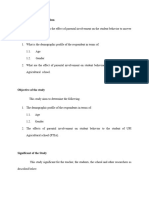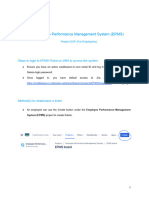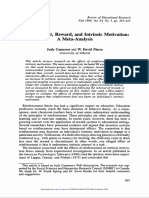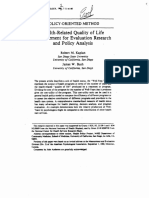Annotated Bibliography
Annotated Bibliography
Uploaded by
api-253604682Copyright:
Available Formats
Annotated Bibliography
Annotated Bibliography
Uploaded by
api-253604682Original Title
Copyright
Available Formats
Share this document
Did you find this document useful?
Is this content inappropriate?
Copyright:
Available Formats
Annotated Bibliography
Annotated Bibliography
Uploaded by
api-253604682Copyright:
Available Formats
Ododa 1
Greg Ododa
Dr. Griffin
English 1102-097
15 March 2014
Annotated Bibliography
"10 Academic Insights on Building, Motivating and Managing an Exceptional Team."
Helpscout.net. Help Scout, 28 Aug. 2013. Web. 13 Mar. 2014.
In this article, team building is the main focus and a list of ten studies is provided. The
author stresses the importance of teams and ensuring they run smoothly. The studies
focus on the importance of diversity within a group, establishing a relationship between
members, and team building activities. The goal of this source is to make the reader
interested in team building and open minded to teamwork. This article will be useful for
my research because it is unique and focuses on the members rather than organization
skills.
Bodwell, Donald. "A Historical Perspective of High Performing
Teams."Highperformanceteams.org. N.p., 2006. Web. 14 Mar. 2014.
This article is a timeline of high performance teamwork throughout the history of
humanity. The author discusses different groups of people throughout history and how
they were successful by using teamwork. The purpose of this source is to inform the
reader on past events that humans are successful through teamwork. This article is
Ododa 2
objective because the author is simply restating history. I found that teamwork is
universal and has been around since the beginning of time which will be useful for my
research. I also learned teamwork has always been in human nature. This article will be
beneficial to my paper because I now have background information on teamwork.
"Building a Positive Team." Mindtools.com. Mind Tools, n.d. Web. 14 Mar. 2014.
This article stresses the importance of maintaining a positive attitude in a team. It uses
research to show the effects of a positive team such as an increase in creativity and
productivity. Positive leaders are a vital part of whether the group stays positive or not.
This article made me think about how important the teams mood is to its success. I think
that the mood of each team member can make or break a team. This article might be
slightly repetitive but it definitely beings up good points and evidence to support it.
"Chapter 14: Team Building." UCSF.edu. University of California San Francisco, n.d. Web. 14
Mar. 2014.
This article is a guide to team building. The author focuses on the importance of
organization and respect for other members. I was able to gather information arguing the
benefits of teamwork and trust within group members. Communication and trust between
team members is essential information that will allow my research to expand. The
information in this article explains the process of team building which is vital for my
research.
Hackman, Richard. "Six Common Misperceptions about Teamwork." Web log post. Harvard
Business Review. Harvard Business, 07 June 2011. Web. 14 Mar. 2014.
Ododa 3
In this article Richard Hackman uses his research in the U.S. intelligence community to
point out six common misperceptions about teamwork. The first misperception he
pointed out was the belief that harmony helps, however he states that research shows that
conflict, when well managed can lead to new creative ideas. The second Misperception
was that mixing up the team would help improve productivity, when in reality it is best to
keep the group intact. Third is that the bigger the group the better but research showed
that larger groups are harder to organize and control. The fourth misperception is that the
use of technology to replace things like mandatory face-to-face meetings is the future and
it should be embraced. In reality the personal contact improves communication within the
group. It all depends on the leader is the fifth misperception. The leaders job is to help
members manage themselves rather than the leader walking the team through each step.
His final misperception is that teamwork is the best way to go about the decisions made,
when in actually the more productive route is for the leader to provide a clear statement
of what the team is to accomplish and to ensure the team has the proper resources and
supports needed to succeed.
Hackman, Richard. "Why Teams Dont Work." Interview by Diane Coutu. Harvard Business
Review. Harvard Business, May 2009. Web. 13 Mar. 2014.
This article uses an interview and the research of J. Richard Hackman, a professor of
Social and Organizational Psychology at Harvard University. It walks the reader through
a series of questions to answer the question, Why Teams Dont Work. The author uses
statistics from research to make certain conclusions to show how factors like poison team
members and lack of leadership causes teams to become inefficient.
Ododa 4
The article gave me interesting facts about how different factors affect the efficiency of a
team. The author stated facts such as how teams that have worked together consistently
have a way less statistical chance of making mistakes. Then he takes it further by
explaining why problems like that have to be weighed out in order to make sound and
well rounded decisions as a leader. This article will help in my search by giving me
factors that affect the productivity of groups and examples that better explain the cause of
the given problem.
Mcnamara, Carter. "All About Team Building." Managementhelp.org. Authenticity Consulting,
n.d. Web. 13 Mar. 2014.
In this article, the author, Carter Mcnamara, provides a list of steps to teach the reader
how to build highly effective teams. Each step builds from the previous one allowing a
clear flow for the reader to follow. It provides necessary information on how to organize
a team and how to ensure the team works well together as a unit.
The first steps deal with setting goals and objectives for the team and the last step is
ensuring praise whenever the team accomplishes these goals. This article also discusses
the importance of communication throughout the entire team, as well as, leadership roles.
After reading this article, I knew it would be beneficial in my research because it
establishes the major steps necessary for a well organized team.
Pentland, Alex. "The Hard Science of Teamwork." Web log post. Harvard Business Review.
Harvard Business, 20 Mar. 2012. Web. 13 Mar. 2014.
Ododa 5
Alex Pentland describes how he led a team at MIT with a goal of finding a science
behind teamwork. By using sociometric badges, they captured how people communicate
and characteristics that make up great teams. The results were broken down into four
points: Communicate frequently, Talk and listen in equal measure, equally among
members, Engage in frequent informal communication and lastly, Explore for ideas and
information outside the group. He states how none of these talk about the substance of the
communication and that other factors such as tone of voice, gesticulation, how one faces
others in the group, and how much people talk and listen are the important points in
communication.
These points all involve communication, which tells me how important communication is
to creating a great team, which gives me another strong focus point in my research.
Sataloff, Robert T. "Teamwork." ENT: Ear, Nose & Throat Journal May 2010: 206. MasterFILE
Complete. Web. 14 Mar. 2014.
In this article Robert Sataloff writes about a statement on high-performance teams that
were developed by the American College of Surgeons. The first part of the article is all
about the medical focus of the statement. The second half is where the main points about
teamwork are made. It gives a list of attributes that a high-performing team should have
such as the recognition and constructive resolution of conflicts. It also lists characteristics
of a good leader and examples of actions that properly executes the given characteristics.
Even with the focus on medicine in this article, the attributes given in order to create a
high-performing team are still applicable to other communities. Looking at the same goal
Ododa 6
of having an efficient team in a different community helps me look at the issue in a
different setting, which expands my view of what a good team looks like.
Williams, Ray B. "Wired for Success." Weblog post. How Teamwork Can Damage Productivity.
Ray Williams, 31 Mar. 2012. Web. 13 Mar. 2014.
This is an informative article on the negative aspects of teamwork. The author provides
other research done in the past that proved teams usually have a worse outcome than
individual work. Social loafing is discussed because it has been found to lower
productivity.
By reading this article, I was able to discover new knowledge about the productivity of
teamwork. The author describes the how people tend to fall under the radar in groups and
become more reliant on the other group members to complete the task. However, the
article also taught me that group work provides to social needs. This article will help my
research by providing me with information on the negative outlook of the productivity of
teams.
You might also like
- ZF Marine Transmission - Operating ManualDocument132 pagesZF Marine Transmission - Operating Manualfwkl85% (13)
- The Thing Beneath the Thing: What's Hidden Inside (and What God Helps Us Do About It)From EverandThe Thing Beneath the Thing: What's Hidden Inside (and What God Helps Us Do About It)Rating: 4.5 out of 5 stars4.5/5 (2)
- Soul Detox Bible Study Participant's Guide: Clean Living in a Contaminated WorldFrom EverandSoul Detox Bible Study Participant's Guide: Clean Living in a Contaminated WorldRating: 5 out of 5 stars5/5 (1)
- The Daniel Dilemma Bible Study Guide: How to Stand Firm and Love Well in a Culture of CompromiseFrom EverandThe Daniel Dilemma Bible Study Guide: How to Stand Firm and Love Well in a Culture of CompromiseRating: 5 out of 5 stars5/5 (1)
- Divine Direction: 7 Decisions That Will Change Your LifeFrom EverandDivine Direction: 7 Decisions That Will Change Your LifeRating: 5 out of 5 stars5/5 (18)
- Reset: Powerful Habits to Own Your Thoughts, Understand Your Feelings, and Change Your LifeFrom EverandReset: Powerful Habits to Own Your Thoughts, Understand Your Feelings, and Change Your LifeRating: 4.5 out of 5 stars4.5/5 (3)
- The Hard Good: Showing Up for God to Work in You When You Want to Shut DownFrom EverandThe Hard Good: Showing Up for God to Work in You When You Want to Shut DownRating: 5 out of 5 stars5/5 (5)
- Soul Detox: Clean Living in a Contaminated WorldFrom EverandSoul Detox: Clean Living in a Contaminated WorldRating: 4.5 out of 5 stars4.5/5 (23)
- The Power to Change: Mastering the Habits That Matter MostFrom EverandThe Power to Change: Mastering the Habits That Matter MostRating: 4.5 out of 5 stars4.5/5 (8)
- Sick of Me: from Transparency to TransformationFrom EverandSick of Me: from Transparency to TransformationRating: 4.5 out of 5 stars4.5/5 (4)
- Healing is a Choice Workbook: 10 Decisions That Will Transform Your Life and the 10 Lies That Can Prevent You From Making ThemFrom EverandHealing is a Choice Workbook: 10 Decisions That Will Transform Your Life and the 10 Lies That Can Prevent You From Making ThemNo ratings yet
- Lead Like It Matters: 7 Leadership Principles for a Church That LastsFrom EverandLead Like It Matters: 7 Leadership Principles for a Church That LastsRating: 4.5 out of 5 stars4.5/5 (2)
- Overcoming When You Feel Overwhelmed Study Guide: 5 Steps to Surviving the Chaos of LifeFrom EverandOvercoming When You Feel Overwhelmed Study Guide: 5 Steps to Surviving the Chaos of LifeRating: 3 out of 5 stars3/5 (1)
- Creatures of Habit: Breaking the Habits Holding You Back from God's BestFrom EverandCreatures of Habit: Breaking the Habits Holding You Back from God's BestRating: 5 out of 5 stars5/5 (1)
- Listen, Love, Repeat Bible Study Guide: Other-Centered Living in a Self-Centered WorldFrom EverandListen, Love, Repeat Bible Study Guide: Other-Centered Living in a Self-Centered WorldNo ratings yet
- How to Have Your Life Not Suck: Becoming Today Who You Want to Be TomorrowFrom EverandHow to Have Your Life Not Suck: Becoming Today Who You Want to Be TomorrowNo ratings yet
- Enough: Silencing the Lies That Steal Your ConfidenceFrom EverandEnough: Silencing the Lies That Steal Your ConfidenceRating: 3.5 out of 5 stars3.5/5 (4)
- From This Day Forward: Five Commitments to Fail-Proof Your MarriageFrom EverandFrom This Day Forward: Five Commitments to Fail-Proof Your MarriageRating: 4.5 out of 5 stars4.5/5 (7)
- The Blessing: Giving the Gift of Unconditional Love and AcceptanceFrom EverandThe Blessing: Giving the Gift of Unconditional Love and AcceptanceRating: 4 out of 5 stars4/5 (42)
- Known: How Believing Who God Says You Are Changes EverythingFrom EverandKnown: How Believing Who God Says You Are Changes EverythingRating: 3 out of 5 stars3/5 (3)
- Mindell: Automation's Finest Hour. Bell Labs and Automatic Control in wwIIDocument8 pagesMindell: Automation's Finest Hour. Bell Labs and Automatic Control in wwIIwatevaid100% (1)
- I Used to Be ___: How to Navigate Large and Small Losses in Life and Find Your Path ForwardFrom EverandI Used to Be ___: How to Navigate Large and Small Losses in Life and Find Your Path ForwardRating: 5 out of 5 stars5/5 (1)
- When Making Others Happy Is Making You Miserable Bible Study Guide plus Streaming Video: How to Break the Pattern of People Pleasing and Confidently Live Your LifeFrom EverandWhen Making Others Happy Is Making You Miserable Bible Study Guide plus Streaming Video: How to Break the Pattern of People Pleasing and Confidently Live Your LifeNo ratings yet
- Love in Every Season: Understanding the Four Stages of Every Healthy RelationshipFrom EverandLove in Every Season: Understanding the Four Stages of Every Healthy RelationshipRating: 4.5 out of 5 stars4.5/5 (4)
- Altar Ego Bible Study Guide: Becoming Who God Says You AreFrom EverandAltar Ego Bible Study Guide: Becoming Who God Says You AreRating: 4 out of 5 stars4/5 (1)
- Stuck Bible Study Leader's Guide: The Places We Get Stuck and the God Who Sets Us FreeFrom EverandStuck Bible Study Leader's Guide: The Places We Get Stuck and the God Who Sets Us FreeRating: 4.5 out of 5 stars4.5/5 (3)
- Liking Jesus Bible Study Guide: Intimacy and Contentment in a Selfie-Centered WorldFrom EverandLiking Jesus Bible Study Guide: Intimacy and Contentment in a Selfie-Centered WorldNo ratings yet
- Attacking Anxiety: From Panicked and Depressed to Alive and FreeFrom EverandAttacking Anxiety: From Panicked and Depressed to Alive and FreeRating: 4.5 out of 5 stars4.5/5 (6)
- Stuck Bible Study Guide: The Places We Get Stuck and the God Who Sets Us FreeFrom EverandStuck Bible Study Guide: The Places We Get Stuck and the God Who Sets Us FreeRating: 4 out of 5 stars4/5 (6)
- Stop the Spiral Devotional: 100 Days of Breaking Free from Negative ThoughtsFrom EverandStop the Spiral Devotional: 100 Days of Breaking Free from Negative ThoughtsNo ratings yet
- Never Less Than: Living Empowered, Esteemed, and Equipped When the World Tells You OtherwiseFrom EverandNever Less Than: Living Empowered, Esteemed, and Equipped When the World Tells You OtherwiseNo ratings yet
- Her True Worth: Breaking Free from a Culture of Selfies, Side Hustles, and People Pleasing to Embrace Your True Identity in ChristFrom EverandHer True Worth: Breaking Free from a Culture of Selfies, Side Hustles, and People Pleasing to Embrace Your True Identity in ChristRating: 5 out of 5 stars5/5 (2)
- Stronger than Stress Bible Study: Developing 10 Spiritual Practices to Win the Battle of OverwhelmFrom EverandStronger than Stress Bible Study: Developing 10 Spiritual Practices to Win the Battle of OverwhelmNo ratings yet
- Break Up with What Broke You: How God Redeems and Rewrites Your StoryFrom EverandBreak Up with What Broke You: How God Redeems and Rewrites Your StoryRating: 5 out of 5 stars5/5 (2)
- Brave Enough to Be Broken: How to Embrace Your Pain and Discover Hope and HealingFrom EverandBrave Enough to Be Broken: How to Embrace Your Pain and Discover Hope and HealingRating: 4 out of 5 stars4/5 (1)
- Unashamed: Drop the Baggage, Pick up Your Freedom, Fulfill Your DestinyFrom EverandUnashamed: Drop the Baggage, Pick up Your Freedom, Fulfill Your DestinyRating: 4 out of 5 stars4/5 (10)
- What Will They Think?: Nine Women in the Bible Who Can Help You Live Your Life BoldlyFrom EverandWhat Will They Think?: Nine Women in the Bible Who Can Help You Live Your Life BoldlyNo ratings yet
- Single, Dating, Engaged, Married Bible Study Guide plus Streaming Video: Navigating Life + Love in the Modern AgeFrom EverandSingle, Dating, Engaged, Married Bible Study Guide plus Streaming Video: Navigating Life + Love in the Modern AgeNo ratings yet
- Pray First Bible Study Guide plus Streaming Video: The Transformative Power of a Life Built on PrayerFrom EverandPray First Bible Study Guide plus Streaming Video: The Transformative Power of a Life Built on PrayerNo ratings yet
- Play with Fire: Discovering Fierce Faith, Unquenchable Passion and a Life-Giving GodFrom EverandPlay with Fire: Discovering Fierce Faith, Unquenchable Passion and a Life-Giving GodRating: 4.5 out of 5 stars4.5/5 (3)
- Stay Here: Uncovering God's Plan to Restore Your Mental HealthFrom EverandStay Here: Uncovering God's Plan to Restore Your Mental HealthRating: 5 out of 5 stars5/5 (1)
- Pray First: The Transformative Power of a Life Built on PrayerFrom EverandPray First: The Transformative Power of a Life Built on PrayerRating: 3.5 out of 5 stars3.5/5 (3)
- Wonderfully Made: Discover the Identity, Love, and Worth You Were Created ForFrom EverandWonderfully Made: Discover the Identity, Love, and Worth You Were Created ForNo ratings yet
- Made for This: 40 Days to Living Your PurposeFrom EverandMade for This: 40 Days to Living Your PurposeRating: 5 out of 5 stars5/5 (1)
- When You Don't Like Your Story: What If Your Worst Chapters Could Become Your Greatest Victories?From EverandWhen You Don't Like Your Story: What If Your Worst Chapters Could Become Your Greatest Victories?No ratings yet
- Restless Bible Study Leader's Guide: Because You Were Made for MoreFrom EverandRestless Bible Study Leader's Guide: Because You Were Made for MoreNo ratings yet
- Stronger: Develop the Resilience You Need to SucceedFrom EverandStronger: Develop the Resilience You Need to SucceedRating: 4 out of 5 stars4/5 (1)
- The Marriage Gift: 365 Prayers for Our Marriage - A Daily Devotional Journey to Inspire, Encourage, and Transform Us and Our Prayer LifeFrom EverandThe Marriage Gift: 365 Prayers for Our Marriage - A Daily Devotional Journey to Inspire, Encourage, and Transform Us and Our Prayer LifeNo ratings yet
- How Happiness Happens Bible Study Guide: Finding Lasting Joy in a World of Comparison, Disappointment, and Unmet ExpectationsFrom EverandHow Happiness Happens Bible Study Guide: Finding Lasting Joy in a World of Comparison, Disappointment, and Unmet ExpectationsRating: 4 out of 5 stars4/5 (12)
- One Prayer Away: Healing Words to Speak Over Your Day (90 Devotions for Women)From EverandOne Prayer Away: Healing Words to Speak Over Your Day (90 Devotions for Women)No ratings yet
- Uninvited Bible Study Guide plus Streaming Video: Living Loved When You Feel Less Than, Left Out, and LonelyFrom EverandUninvited Bible Study Guide plus Streaming Video: Living Loved When You Feel Less Than, Left Out, and LonelyRating: 1 out of 5 stars1/5 (1)
- How Did I Get Here?: Finding Your Way Back to God When Everything is Pulling You AwayFrom EverandHow Did I Get Here?: Finding Your Way Back to God When Everything is Pulling You AwayRating: 4.5 out of 5 stars4.5/5 (10)
- You're Going to Make It: 50 Morning and Evening Devotions to Unrush Your Mind, Uncomplicate Your Heart, and Experience Healing TodayFrom EverandYou're Going to Make It: 50 Morning and Evening Devotions to Unrush Your Mind, Uncomplicate Your Heart, and Experience Healing TodayRating: 4.5 out of 5 stars4.5/5 (2)
- ProposalDocument3 pagesProposalapi-550142003No ratings yet
- Topic Planner in Enhanced Grade 8 Mathematics: Department of EducationDocument20 pagesTopic Planner in Enhanced Grade 8 Mathematics: Department of EducationRenel Mapindan0% (1)
- Chapter 8. Analysis of Slope Stability: AssignmentDocument9 pagesChapter 8. Analysis of Slope Stability: AssignmentDuyAnhThảoNo ratings yet
- Lab 1 - Getting Started With Opnet ModelerDocument18 pagesLab 1 - Getting Started With Opnet Modelertexilion100% (1)
- 中德材料对照表 (1)Document7 pages中德材料对照表 (1)pkfpNo ratings yet
- Milling Machine PPT - 002010301098Document13 pagesMilling Machine PPT - 002010301098দেবার্ঘ্য চক্রবর্তীNo ratings yet
- FS1-Episode 3Document9 pagesFS1-Episode 3Angela MagallanesNo ratings yet
- g12-iii-module-4-for-helpingDocument30 pagesg12-iii-module-4-for-helpingcharlenejoy.coNo ratings yet
- Abigail P.R.1Document6 pagesAbigail P.R.1Divine MobatoNo ratings yet
- Employee Performance Management System (EPMS) Project SOP - For EmployeesDocument8 pagesEmployee Performance Management System (EPMS) Project SOP - For Employeesrakhi.chadagaNo ratings yet
- RPT Stdlist Daterange LocateDocument12 pagesRPT Stdlist Daterange Locatewhrdgwsh25564No ratings yet
- NITT - MBA T&P Resume TemplateDocument1 pageNITT - MBA T&P Resume Templateparthiban44018933No ratings yet
- Self InspectionDocument2 pagesSelf Inspectionmuhammad qasimNo ratings yet
- Vlave Stem Leack Tightness Method PDFDocument82 pagesVlave Stem Leack Tightness Method PDFkdalavadi3905No ratings yet
- Design For Thermal Comfort During Summer & Psychometry Tool For Human ComfortDocument8 pagesDesign For Thermal Comfort During Summer & Psychometry Tool For Human ComfortSwapan Kumar SarkerNo ratings yet
- Features General Description: Ht78Xx Series 500ma Tinypower LdoDocument9 pagesFeatures General Description: Ht78Xx Series 500ma Tinypower LdomessyaxNo ratings yet
- Study School Strategic Human Capital Management 5909Document28 pagesStudy School Strategic Human Capital Management 5909taka ndofirepiNo ratings yet
- Reinforcement, Reward, and Intrinsic Motivation: A Meta-AnalysisDocument61 pagesReinforcement, Reward, and Intrinsic Motivation: A Meta-AnalysisThin LeNo ratings yet
- 15-Minute City. PTDocument14 pages15-Minute City. PTLisbeth MartinezNo ratings yet
- Measurement Research: Health-Related Quality of Life For Evaluation and Policy AnalysisDocument20 pagesMeasurement Research: Health-Related Quality of Life For Evaluation and Policy AnalysisAshraf Uddin AhmedNo ratings yet
- Similar Triangles Student HandoutDocument6 pagesSimilar Triangles Student HandoutLaurieBrookeNo ratings yet
- Technical FileDocument15 pagesTechnical Fileحمد عبداللهNo ratings yet
- Reviewer STSDocument10 pagesReviewer STSMark Harold Pega100% (1)
- Complete Download Fundamentals of Ecosystem Science 2nd Edition Kathleen C. Weathers PDF All ChaptersDocument57 pagesComplete Download Fundamentals of Ecosystem Science 2nd Edition Kathleen C. Weathers PDF All Chapterssaebische100% (2)
- Openmind 1 Unit 6 Class Video WorksheetDocument2 pagesOpenmind 1 Unit 6 Class Video WorksheetJC ZhambNo ratings yet
- Student CongressDocument5 pagesStudent CongressDan CuizonNo ratings yet
- QFD: House of Quality: Rupam Singh PGP25/104 Operations Management Iim Kozhikode Selection Process DateDocument1 pageQFD: House of Quality: Rupam Singh PGP25/104 Operations Management Iim Kozhikode Selection Process DateChirayu VijaywargiyaNo ratings yet
- VC New FormatDocument11 pagesVC New FormatAlankar DalviNo ratings yet

























































































